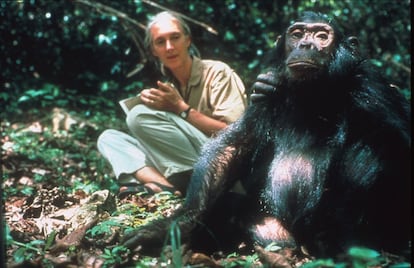Jane Goodall: ‘Defending the environment with anger is counterproductive’
The renowned British primatologist and ethologist reflects at 90 on the power of empathy and calls on decision-makers to act against biodiversity loss: ‘I hope COP16 is not just all talk’

Jane Goodall was four years old when she went on vacation with her mother to a large farm where cows, pigs, and horses all lived together. There, a young Goodall became obsessed with finding out how it was possible for an egg to come from a hen, so she hid in one of the six coops and waited. She squatted for four hours until she saw the brown bird lift its wings slightly and drop a white egg onto the straw. That was, according to the ethologist, the birth of a little scientist. The patience and curiosity that accompanied Goodall continue to guide the hand of the world’s most renowned primatologist at the age of 90. Today, determined to “touch the hearts” of those who listen to her, she defends environmental activism with two unique weapons: empathy and an overflowing source of hope. “There is still room for action,” she tells EL PAÍS during her visit to Medellín, Colombia. “We have four engines: the intellect of humans, the resilience of nature, young people, and an indomitable spirit.”
When she had not yet turned 30, Goodall had already shaken the basic concepts of science by demonstrating how similar we are to chimpanzees, with whom we now know that we share 98.7% of our DNA. In addition to revolutionizing the definition of “human being” by discovering that primates were also capable of creating tools, she demonstrated that we shared emotions such as sadness, empathy, and even a sense of humor. “If primates had a language, we would also be amazed by how similar it would be to ours,” Goodall, the U.N. messenger for peace at the “Reasons for Hope” conference organized by Caja de Compensación Familiar de Antioquia (Comfama) and Elemental, said on August 22.
Goodall took to the stage with the famed Mr. H. — a stuffed monkey that never leaves her side — and a glass of whiskey. She didn’t let anyone help her with the stairs, but smiled kindly at anyone who tried. She sat wrapped in a hummingbird shawl she’s had for years — she hasn’t bought clothes in two decades — and recounted dozens of anecdotes with the same passion and tenderness as when she first told them. She said that if she closes her eyes, she can relive her memories. She touched upon the courage of her mother, with whom she entered the Tanzanian jungles seven decades ago because she was not allowed to be left alone; to the first time the chimpanzee David Greybeard sat next to her and showed her how he had shaped a contraption to eat termites; or to when the professors on her doctorate course, which she took without any previous study, told her she had done everything wrong. “They told me I couldn’t talk about chimpanzee emotions, or give them names, or say they had altruistic gestures or personalities,” said the Templeton Award winner. “But I had a teacher before them who proved that what they were saying was absolute nonsense. That teacher was my dog, Rusty.”
It’s hard not to wonder how this woman who has been talking about the same thing for years — she’s on a world tour 300 days out of 365 annually — and using the same anecdotes, was able to sell out the Metropolitan Theater in Medellín in 12 minutes. A few seconds of chatting are enough to understand. Her words are balm in the face of a sometimes catastrophist and overwhelming environmentalist discourse. “Using rage to defend the environment is counterproductive.” And that’s when Goodall turns everything upside down: “We must find the story that can touch the hearts of those who don’t think like us.”
Question. You have said that animals will eventually reclaim the territory we have stolen from them. How do you think they will do that?
Answer. They can’t do it without our help. We’re building machinery that’s destroying nature. And we’re the ones with intellect! They can’t do anything about it, they’ll just try to get back at us if we cooperate. And we’re going to be screwed if we don’t understand that destroying biodiversity and climate change go hand-in-hand, and do something about it. But there are many communities in many countries that know the importance of living in harmony with nature, and they’re not necessarily part of the education system. That’s what has to change. People have to genuinely understand what we’re experiencing and then they’ll start to change. The more people care about the future, the more we can safeguard it.
Q. There is a large part of environmental activism that is deeply angry. Is anger effective?
A. No. Defending the environment with anger is counterproductive. I know activists who go after businessmen or politicians, point their fingers at them, and are angry and tell them that they have to change because they are bad. The only thing you will achieve by doing so is for them to attack you back, or they will just not listen to you. Rather than attacking them intellectually, it is better to try to get to their heart. How do you do that? Find out what that person is like until you find the story that can touch their heart. And maybe at that point, you won’t even know that you’ve changed something inside. But it will come.
Q. Is a new political generation concerned with ecology emerging?
A. Yes, absolutely. We know a lot of people in positions of power who started out in our Roots and Shoots program [Goodall’s education program that has a presence in 70 countries], in 1991. But we face a big challenge in getting this kind of knowledge to where there are dictatorships or governments that don’t want this information. It’s a big challenge. And I’m not the person who has to solve those problems.
Q. There are studies that speak of the importance of friendship between male chimpanzees for their reproduction. Are we humans also stronger together?
A. For me, the male chimpanzee is involved in a fierce competition for dominance and has three strategies to achieve it. The first is through brute force. These males get to the top, but they don’t last long there, because they make everyone turn against them. Second, using intellect. A good example is when I saw that a male would only dare to attack a higher-ranking male if his brother was there to protect him. And the third is perseverance. You go and try again and again and again. Until the others get tired and say: I can’t take it anymore! And they let you move up. And that can be an interesting thing for humans who want to get to the top: you have to use your intellect, be persistent, and not be aggressive.

Q. What can we expect from COP16, which will be held in Colombia?
A. I hope that COP16 is not just all talk and that politicians come to the conclusion that the impact on biodiversity and climate change has to stop. People in power have to understand this. And also that we still have time to work together. First, so that people have a decent life, so that grandchildren and great-grandchildren have a chance to live. And second, to give nature space to survive.
Q. Considering your career, what still surprises you today?
A. How stupid some people are. [Laughs].
Q. Until you came to science, it was said that to be a good scientist, you had to be objective. To what extent did the coldness of science influence our ability to empathize?
A. It used to be that way. Now there are more and more scientists who understand that we need to study empathy and emotions. Before, only species were studied, not individuals. And we had to change that way of doing science. Until we understood that, we didn’t realize that individuals are capable of changing communities. And it is the same with humans. An example is wars; it is individuals who make them happen. It happened with Hitler and Stalin and now with Netanyahu and Putin.
Sign up for our weekly newsletter to get more English-language news coverage from EL PAÍS USA Edition
Tu suscripción se está usando en otro dispositivo
¿Quieres añadir otro usuario a tu suscripción?
Si continúas leyendo en este dispositivo, no se podrá leer en el otro.
FlechaTu suscripción se está usando en otro dispositivo y solo puedes acceder a EL PAÍS desde un dispositivo a la vez.
Si quieres compartir tu cuenta, cambia tu suscripción a la modalidad Premium, así podrás añadir otro usuario. Cada uno accederá con su propia cuenta de email, lo que os permitirá personalizar vuestra experiencia en EL PAÍS.
¿Tienes una suscripción de empresa? Accede aquí para contratar más cuentas.
En el caso de no saber quién está usando tu cuenta, te recomendamos cambiar tu contraseña aquí.
Si decides continuar compartiendo tu cuenta, este mensaje se mostrará en tu dispositivo y en el de la otra persona que está usando tu cuenta de forma indefinida, afectando a tu experiencia de lectura. Puedes consultar aquí los términos y condiciones de la suscripción digital.









































